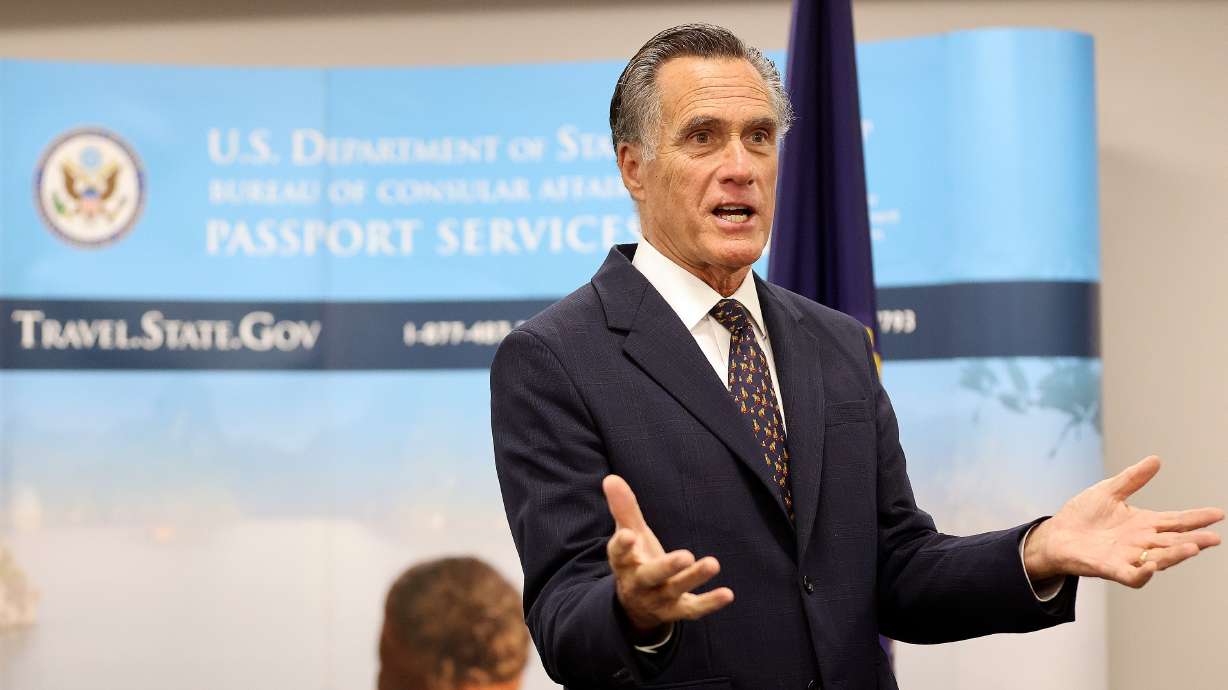Estimated read time: 3-4 minutes
This archived news story is available only for your personal, non-commercial use. Information in the story may be outdated or superseded by additional information. Reading or replaying the story in its archived form does not constitute a republication of the story.
WASHINGTON — As U.S. lawmakers continue to wrestle with the immigration issue, Sen. Mitt Romney is again pursuing legislation mandating the use of the federal E-Verify system to guard against the hiring of unauthorized workers.
The Utah Republican introduced a measure with a similar provision last fall and, before that, in 2021. Those earlier measures, which ultimately stalled, also called for increases in the federal minimum wage, which were not included in the new proposal, the Mandatory E-Verify Act of 2024.
Romney, joined by several other GOP lawmakers in introducing the measure, described it as taking up where President Joe Biden's executive action limiting asylum requests by border crossers leaves off. Biden announced his executive order last week as a means of getting control of increased numbers of immigrants surging to the U.S.-Mexico border.
"President Biden's last-ditch effort to limit asylum is too little, too late. Millions of illegal immigrants have already flooded into our country under his watch, and his executive order falls short in stopping widespread illegal employment," Romney said in a statement on Thursday. "By requiring all employers to use E-Verify, our legislation would ensure that businesses only hire legal workers — eliminating a key driver of illegal immigration and protecting jobs for hardworking Americans."
Some private employers, though, bristle at E-Verify mandates, seeing them as a form of government intrusion. A Utah lawmaker in 2022, then-Rep. Joel Ferry, called into question the effectiveness of E-Verify as state lawmakers were debating a state mandate on use of such systems.
"Ultimately I do not believe it is the job of private employers to act as an (immigration enforcement) worker. That's not their job. That's the federal government's job," Ferry, now the executive director of the Utah Department of Natural Resources, said at the time.
At any rate, the new measure has backing from a broad U.S. Senate contingent, including Sens. Tom Cotton, R-Arkansas; Bill Cassidy, R-Louisiana; James Lankford, R-Oklahoma; JD Vance, R-Ohio; and Joe Manchin, I-West Virginia. The new measure would also increase civil and criminal penalties on employers who hire workers without work authorization, according to a summary of the measure provided by Romney.
"E-Verify protects employees and employers," Cassidy said in a statement. "It is an essential tool in controlling immigration and protecting Americans' jobs."
Manchin noted that expanded E-Verify use was included in a 2013 immigration overhaul that passed in the Senate but failed in the House. "I will continue to support all components of that compromise — including E-Verify, stronger border security and expanded pathways for legal immigration," Manchin said.
E-Verify is a web-based system that allows employers to verify the employment eligibility of would-be hires. Utah lawmakers passed updated legislation in 2022 that makes employers with 150 or more workers use "status verification" systems like E-Verify when hiring new workers. The prior version of the law had mandated the use of such systems by employers with 15 or more employees, and the update aimed in part to reduce the number of businesses required to abide by its provisions.
Still, Ferry noted shortcomings of E-Verify, which per federal law must be used by contractors doing business with the federal government. He said he had heard of an instance of E-Verify deeming a worker applying for work with one employer as ineligible but as eligible with another employer. He also said the Utah law isn't enforced.
"A lot of employers are not utilizing it. They're just not doing it because it doesn't work. There's no enforcement," he said during a Feb. 7, 2022, committee hearing on the measure.









